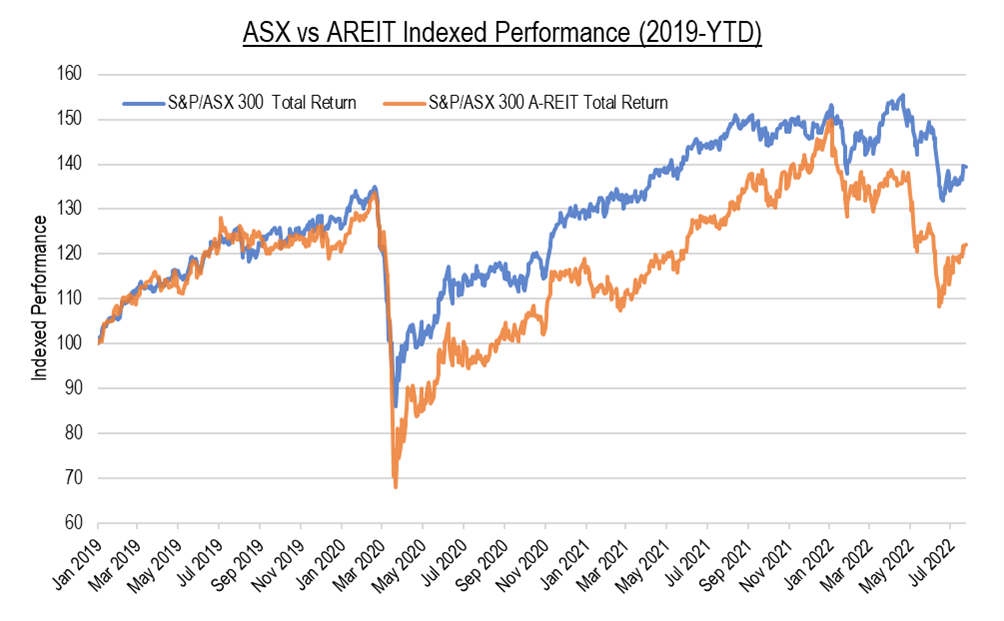AREITs back off the floor (again)
Nothing has been easy over the last few years, least of all investing in A-REITs.
After a decade of reliable returns prior to 2020, a global pandemic made panic the norm. From an investment perspective, there were few places to hide.
In the 2020 financial year, with lockdowns and a high exposure to retail, AREITs underperformed equities. The leasing code of conduct that mandated tenant financial support slugged the sector.
Retail (notably discretionary) was hit hard and the (still) unknown impact of work from home (WFH) on the office sector added to the uncertainty.
The divergence in performance was stark with the pandemic winners, industrial and the alternative asset sectors far outstripping retail and office. However, this outperformance didn’t make up for the shortfall of office and retail which makes up around 60% of the AREIT index hence the sectors performance relative to other asset classes was weak.
In the early stages of the crisis, we readjusted the APN AREIT Fund portfolio, minimising our exposure to discretionary retail and CBD office while increasing allocations to industrial and alternative asset classes such as childcare and service stations which performed relatively well through the pandemic.
Then came the recovery
After the pandemic-induced lows of March 2020, in the 2021 financial year AREITs rose 33.2% and equities 27.8%. AREITs in particular were driven by the investment themes of funds management, logistics, and storage along with the COVID recovery trade.
The 2022 financial year just ended was a tale of two halves. In the six months to 31 December 2021, AREITs delivered a stunning return of 15.3% compared to 4.0% from equities.
In the following six months to June 2022, there was a staggering reversal. AREITs fell 23.0% while equities dropped 10.4%. After a year that started with so much promise, AREITS returned -11.2% over FY22, 4.4% lower than equities, which returned -6.8%.
What can we expect from the future?
The optimism engendered by cashed-up consumers exiting from lockdowns, spurred by stimulus spending and global recovery, has been followed by pessimism as supply chain constraints and the invasion of Ukraine spurred inflation in tight labour markets. As rates rise, the threat of recession looms ever larger.
This has affected the AREIT sector in three ways.

First, companies carrying higher debt (gearing) and that have lower levels of debt hedging have been punished. Debt is now on the nose. Despite their relatively predictable earnings, investors have little regard for the AREIT sector’s low average gearing of 25%1, which is well below the long-term average of 30%2.
Such fears are unwarranted. In the post-global financial crisis period, AREIT management teams have reduced their use of debt, expanded funding sources and extended debt tenure. This helps reduce risk and offers a level of earnings shelter through periods of interest rate volatility. These are admirable characteristics in this environment.
Second, after an incredibly strong few years, funds management and logistics AREITs like Goodman Group (ASX:GMG) and Charter Hall Group (ASX:CHC) have been punished. As investors reassess their ability to maintain rapid growth, there has been a significant reduction in the earnings multiples applied to future growth.
GMG was down 33%3over the second half of FY22 while CHC fell a staggering 46%4. At the beginning of the 2022 these two stocks accounted for over 34%5of the AREIT index. Their dramatic share price declines have therefore hit the AREIT index hard.
Both stocks attracted investors with little regard for real estate fundamentals. Once the change in market psychology took place, they quickly departed.
Whilst these companies became victims of their own success, they remain large, high-quality, diversified businesses carrying relatively low levels of debt (GMG. That said, the growth they offer comes at a price, especially when compared to other REIT markets globally.
Finally, AREIT analysts have been lowering earnings expectations and forecasting the value impacts of higher rates in the year ahead. This has added to the pressure on AREIT share prices.
A global pandemic followed by the largest global inflation outbreak in 30 years has created a treacherous environment. After a difficult financial year, AREIT investors are under the pump but can take comfort from a few factors that have been forgotten lately.
In eight of the last 12 years, AREITs have outperformed equities.
During the current conflagrations, AREIT landlords will continue collecting rents from a diversified pool of quality tenants. This should provide a level of earnings certainty in an uncertain environment which will gain the attention of investors at some point.
As we have written previously AREIT investors tend to benefit when interest rates are rising, though often underperform leading into the initial threat of higher rates. [See It’s (not) the end of the world as we know it (and we feel fine) and Conventional wisdom is wrong. Rate rises are good for property trusts.]
Finally, a significant proportion of rental contracts are inflation-linked. Rising interest rates do push up the cost of debt servicing but for AREITS the increases in rents received will assist in diminishing this impact.
For income investors worried about the impact of rising rates, AREITs offer a safe harbour, reasonable returns and a reliable income stream. That’s something to think about in this environment.
Broaden your income horizons
APN Real Estate Securities (RES) is a specialist investment manager that actively manages portfolios of listed property securities. Since inception in 1998, our deep understanding of real estate and “property for income” philosophy, together with a highly disciplined investment approach has been the backbone of our performance. Click here to find out more.

2 topics
1 fund mentioned

